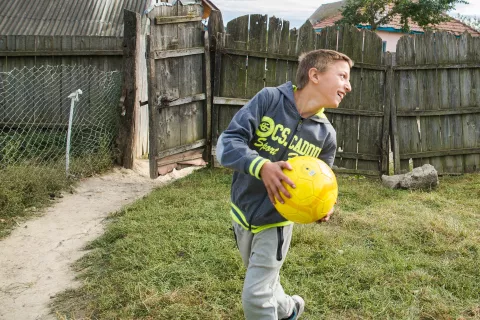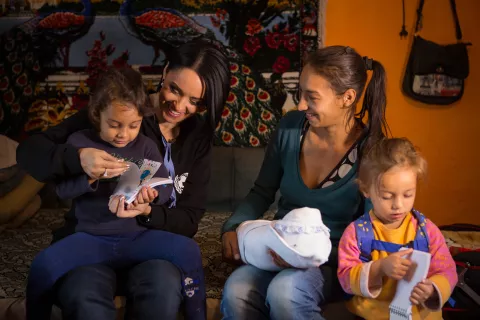A family and a community for every child

- Available in:
- English
- Română
On 21 September 2017, the National Authority for the Protection of Child Rights and Adoption (NAPCRA), together with UNICEF in Romania, the World Bank, and with the support of Constanța County Council – the General Directorate for Social Assistance and Child Protection have organised a media briefing focused on the issue of deinstitutionalisation. The event took place at ‘Orizont’ Community-based Services Complex, one of the four centres in Constanța County to be closed down, transitioning to family and community-based child care services.
“Continuing the deinstitutionalisation process is one of the priorities we are committed to and it can only be undertaken through a joint effort of the local and central authorities. Our shared goal is to ensure children in public care have the best setting for development and care, and real life has proved that placement centres are unable to offer the environment children need. I strongly believe that closing down the current placement centres and seeing to ensuring the transition to alternative community-based services is the only solution we ought to be considering,” said Ms. Gabriela Coman, President of the National Authority for the Protection of Child Rights and Adoption.
For 2014-2020, Romania has set several priorities with respect to closing down old residential institutions for children and transitioning to community-based services, early interventions and prevention measures designed to safeguard children’s right to grow up in a family environment. In Romania, nearly 19,000 children receive residential care. Where children, particularly those under age 3, are concerned, there is well-known scientific evidence that the younger the age at which they are placed into residential care, the higher their exposure to the risk of delayed cognitive, social and emotional development. In addition, scientific research underlines the major role played by alternative care in children’s well-being.
“Children in the care of the General Directorate for Social Assistance and Child Protection are no less entitled to grow up in an environment closely resembling a family. From the very beginning of my mandate, I have made every effort to ensure the institutionalised children’s reintegration into their families, community and society. We all have a duty to make sure they grow up in settings that foster their emotional and social development. This project is a key stepping stone to ensuring the nearly 260 institutionalised children enjoy a family environment, more care and attention, as well as a real chance at a healthy balanced life. I assure you they will have my full support towards integration and observance of their rights,” said Mr. Marius Horia Țuțuianu, Chairman of Constanța County Council.
To strategically prioritise reform measures, NAPCRA together with the World Bank and UNICEF initiated a comprehensive analysis of the public child care system in Romania. The findings highlighted the need to close down the existing placement centres across the country and to develop alternative services by increasing the number of foster carers, setting up small group homes or apartments, as well as support services for the natural or substitute family, such as day centres or community centres, including rehabilitation, counselling or other social services.
“It is in the child’s best interest to grow up in his or her family, where possible, and that benefits the family as well as the community and society overall in many ways. With the Minimum Package of Services pilot project, UNICEF together with its partners have proved that it is possible to prevent unnecessary child-family separations using limited resources, and that families are able to take better care of their children when they receive integrated community-based support services. Therefore, in the following period of time, we need to ensure children’s transition from residential services to family- and community-based solutions and prevent unnecessary separations,” said Pieter Bult, UNICEF Representative in Romania.
“In Romania, one in five children aged between 15 and 27 in residential care has spent his/her entire life in an institution and almost one in three children has spent 90 per cent of their life in the system. Depriving children of an adequate family environment lessens their chances of succeeding in life and curbs their full personal and professional development,” said Suzy Yoon-Yildiz, Senior Operations Officer, the World Bank. "There is an urgent need to make sure that institutionalised children are adequately integrated within families and that they have independent life skills while they are integrated into society. The World Bank will continue its efforts towards a Romania in which all children have a chance to a better life.”
Media contacts
Additional resources
About the National Authority for the Protection of Child Rights and Adoption (NAPCRA)
National Authority for the Protection of Child Rights and Adoption (NAPCRA) runs as a specialty body of the central public government, with legal personality, under the subordination of the Ministry of Labour and Social Justice. The mission of NAPCRA is to monitor the observance of all children’s rights and to take all measures contributing to the foundation of a dignified society for children, engaging in this process central and local public authorities, civil society, parents and children.
About UNICEF
UNICEF works in some of the world’s toughest places, to reach the world’s most disadvantaged children. Across more than 190 countries and territories, we work for every child, everywhere, to build a better world for everyone.
Follow UNICEF on Twitter and Facebook
About the World Bank
The World Bank has been supporting Romania’s efforts to promote growth and prosperity and to achieve its national priority targets ever since 1973 when the Bank launched its first economic mission in this country. Since then, the World Bank has ensured over 12.6 billion dollars in loans, guarantees and grants in a wide range of sectors. Recently, the World Bank, together with UNICEF and the National Authority for the Protection of Child Rights and Adoption (NAPCRA), have launched a comprehensive data collection and analysis process to understand the root causes of how children in Romania become separated from their natural families and to document their respective experience in the field of alternative care. The World Bank is currently working with central and local authorities in Romania to identify the necessary priority steps towards reform and increased investment in the child protection system.





